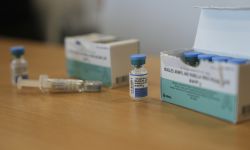Experts fear Michigan may not have enough hospital beds for coronavirus

Imagine a hospital where so many patients have flooded the hallways that a doctor has to decide who gets treatment and who doesn’t.
Who gets a ventilator, who doesn’t. Who lives and who dies.
Those decisions — common on a battlefield — have also occurred in China and Italy in the last two months as the new coronavirus spreads worldwide.
And those would be the sorts of decisions that the health care community in Michigan would have to take if its 25,000 hospital beds aren’t enough to handle the anticipated crush of victims of coronavirus, formally known as COVID-19.
Hospital preparedness experts at the University of Michigan are calling for Michigan hospitals to make nearly 8,000 beds available for critical care victims — 50 percent more beds than the state’s plan to handle mass casualty events and other disasters.
In New York City, Mayor Bill de Blasio on Monday called upon the medical community to identify all potential health care facilities, saying the need will be unlike any seen before in the city. In Ohio, Gov. Mike DeWine’s staff has recommended people cancel elective surgery.
In Michigan, the state hospital association has implored its members to prepare for “surge capacity,” which may mean cancelling elective surgery and moving patients eligible for care in a less intense setting.
“This is unprecedented in size, scale and scope,” Dr. Vineet Chopra, chief of hospital medicine at the University of Michigan’s academic medical center, wrote in an email to Bridge.
“Every resource we have is being constrained and pushed as we prepare to take care of a large number of COVID patients.”
Already, U-M’s medical center has canceled elective procedures, Chopra said. He and a colleague have suggested hospitals begin planning to make nearly a third of all beds available.
That may mean canceling surgeries, turning single rooms into doubles and discharging patients as soon as it’s safe to do so, he said.
Currently, the state disaster plan calls for having 20 percent of all beds available during a surge. Chopra feels the anticipated coronavirus surge requires more beds.
Chopra said preparations must occur now, before a potential wave of patients hits, so health care professions “don’t have to make hard decisions or major shifts in operations on the fly.”
Those “hard decisions” are spelled out in state of Michigan guidelines on dealing with scarce health care resources. Among them, is to consider the conditions of all patients and make decisions on who has the best chance to survive.
Hospitals, according to a state “toolkit” on preparedness, should have committees of health care workers, including doctors, nurses, an ethicist and an attorney, to weigh several factors when critical resources are limited.
In the end, if the hospital cannot get, for example, a ventilator from another unit or a nearby hospital, it can decide to take it from one patient and give to another if the recipient has “a greater chance of survival, based on objective clinical parameters.”
Those heart wrenching decisions could be fewer if the virus’ infection rate is slowed by the restrictions being placed on schools and businesses.
That’s why hospitals cheered Gov. Gretchen Whitmer’s actions to restrict large groups, said Ruthanne Sudderth, a senior vice president with the Michigan Health and Hospital Association. If the state’s actions slow the rate of infection, then hospitals might have the capacity to treat everyone.
“They are the things we need to take early on to prevent a spike in the [infection rate] curve,” Sudderth said. It is the Italian experience that has everyone worried. “That’s the spike we don’t want here.”
While Michigan’s 25,400 hospital beds is equivalent to 2.5 for every 1,000 people, there are more beds per capita in southeast Michigan than there are in west and northern Michigan.
In some parts of west and northern Michigan, the rate is 1.9 beds per 1,000. Only metro Detroit and parts of the Interstate 75 corridor have rates above 2.5 per 1,000 (the U.S. rate is 2.4 beds per 1,000).
RELATED:
- How to prepare for coronavirus in Michigan. Step 1: Breathe
- How to make your own hand sanitizer during coronavirus shortage
- Can I get tested for coronavirus in Michigan and other questions answered
- The first line of defense against coronavirus: Try soap, not a mask
But in Italy, one of the hardest hit places in the world, there are 3.2 beds per 1,000 — 28 percent more than Michigan — and that was insufficient because so many people got sick at the same time, swamping a modern and well-equipped health care system.
Some blame Italy’s high infection rate on its slow move toward limiting travel and social contact. It was only after a couple weeks of rising infections that the country shut down almost all activity.
As facilities were quickly overloaded, inflatable tents were propped up to screen patients and hallways were lined with beds because of a dearth of rooms.
That’s why Whitmer and other governors have taken action to limit gatherings and hopefully slow the rate of infection.
Because it’s not just the COVID-19 victims: The fear is there will be so many their treatment will affect the outcomes of other patients, like those who have had a heart attack or stroke or been in a car crash.
Michigan leaders “are doing the responsible thing,” said Brian Peters, the CEO of the Michigan Health and Hospital Association.
MHA officials said members of regional hospital coalitions are working together to identify critical equipment, such as respirators, especially important in fighting COVID-19, and personal protective gear.
Lynn Sutfin, a spokeswoman for the Michigan Department of Health and Human Services department, said hospitals and the regional coalitions are constantly preparing for major events.
“Hospitals routinely exercise medical surge scenarios as part of their preparedness activities,” Sutfin said. “Strategies for diversion are regularly implemented at the local level.”

See what new members are saying about why they donated to Bridge Michigan:
- “In order for this information to be accurate and unbiased it must be underwritten by its readers, not by special interests.” - Larry S.
- “Not many other media sources report on the topics Bridge does.” - Susan B.
- “Your journalism is outstanding and rare these days.” - Mark S.
If you want to ensure the future of nonpartisan, nonprofit Michigan journalism, please become a member today. You, too, will be asked why you donated and maybe we'll feature your quote next time!








